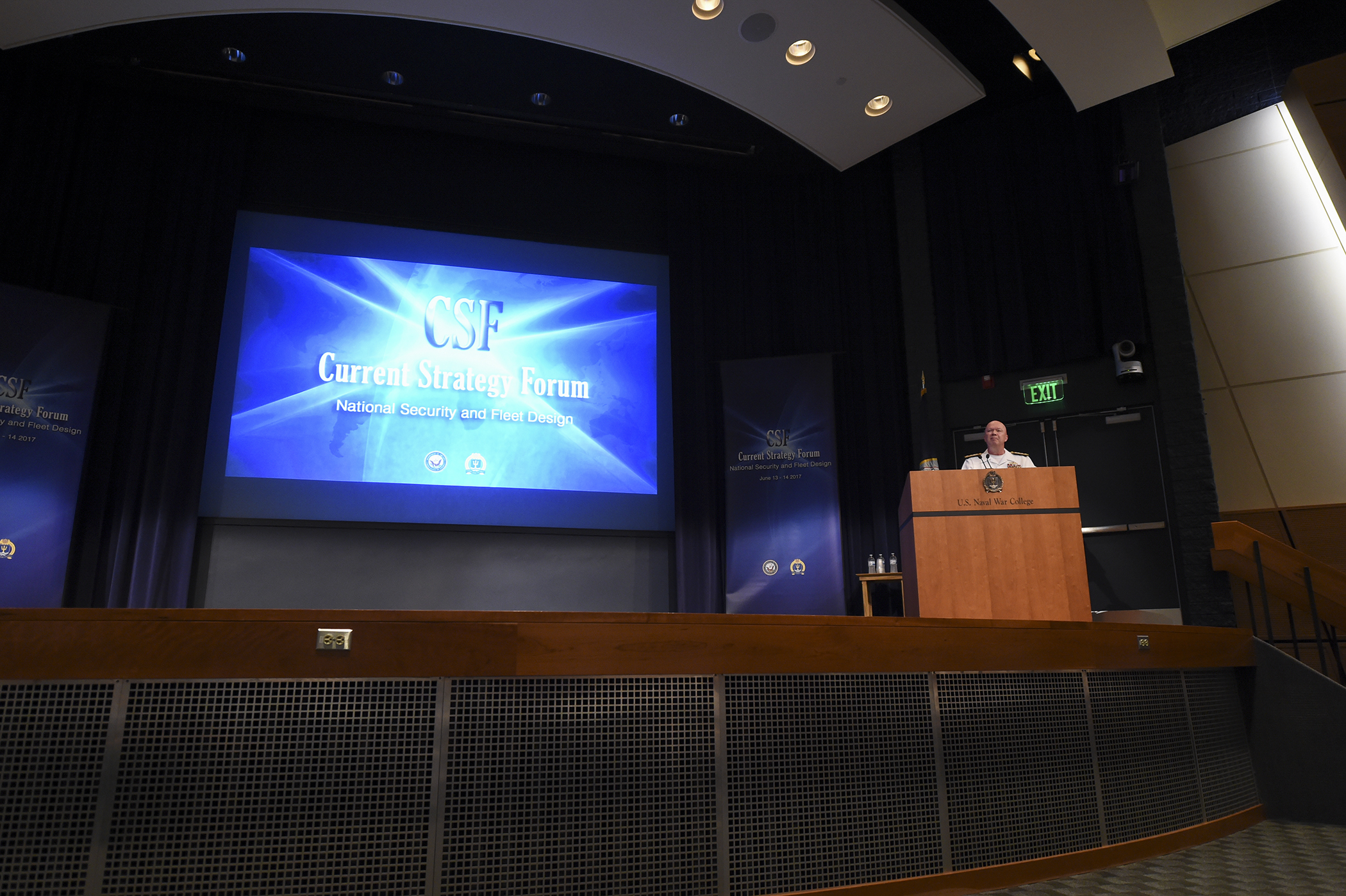Fleet design, national security focuses of Naval War College forum

NEWPORT, R.I. – U.S. Naval War College (NWC) Newport, Rhode Island hosted the 68th Current Strategy Forum (CSF) this week bringing together national security experts from the military, academics, government and private industry to explore wide-ranging issues of national and international importance.
CSF is the annual Capstone event for the NWC academic year and this year’s theme, “National Security and Fleet Design” focused on the classic strategic problems of balancing ends, ways and means in constructing the Fleet.
The two-day forum, hosted by the Rear Adm. Jeffrey Harley, president, NWC, brought together civilian and military leaders to discuss the future strategy of the United States.
The decades-old event remains important for decision makers who want to understand the national security strategic environment.
“The objective of CSF, which dates back to 1949, is to bring leading thinkers to the college to share their perspectives on a topic of strategic importance,” said Michael Sherlock, professor in Academic Affairs and organizer of the event. “To add a broader and more diverse perspective to the audience, we reach out to the private sector and the community, leaders from business, academia, state and local government and invite them to join our students and share ideas on a variety of topics related to national security.”
Naval War College students were the focal point of much of the discussion and were told be open to differing ideas.
“Learn to consider other perspectives,” said Harley in his welcome remarks. “Listen to alternative views. Be curious and ask questions. Engage in the discussion. This is what will make you a better decision maker and problem solver, and our nation needs both.”
Harley kicked off the event with welcome remarks and introduced keynote speaker Honorable John Lehman Jr., secretary of the Navy from 1981-87, who spoke on the importance of the college in resolving conflict from the Cold War through the present.
The changing world presents many challenges for the students, according to Harley. “The challenges are many. America and her allies must wrestle with on-going conflicts in the Greater Middle East, with fighting occurring daily throughout the region, from Syria to Afghanistan,” he said. “The problems posed by terrorism, irregular warfare, and the use of weapons of mass destruction remain in the headlines, and will continue to shape the character of many struggles around the globe.”
Additional keynote speakers over the two days were Adm. John Richardson, chief of naval operations; Gen. Robert Neller, commandant, U.S. Marine Corps; Michael Austin, American Enterprise Institute; Harlan Ullman, Atlantic Council; and Robert Kaplan, Center for a New American Security.
Three panel discussions, "Enduring Strategic Principles and Present Day Challenges," "National Security and the Maritime Force," and "Future Challenges and Ways Ahead," were also held over the course of the forum.
NWC is a one-year resident program that graduates about 600 resident students and about 1,000 distance learning students each year. Its primary mission is to educate and develop future leaders. Additional missions include: helping to define the future Navy and its roles and missions, supporting combat readiness, strengthening global maritime partnerships, promoting ethics and leadership throughout the force, contributing knowledge to shape effective decisions through our Maritime History Center, providing expertise and advice to the international legal community through the Stockton Center for the Study of International Law. Students earn Joint Professional Military Education (JPME) credit and either a diploma or a master’s degree in National Security and Strategic Studies or Defense and Strategic Studies. Established in 1884, U.S. Naval War College is the oldest institution of its kind in the world. More than 50,000 students have graduated since its first class of nine students in 1885 and about 300 of today’s active duty admirals, generals and senior executive service leaders are alumni.
